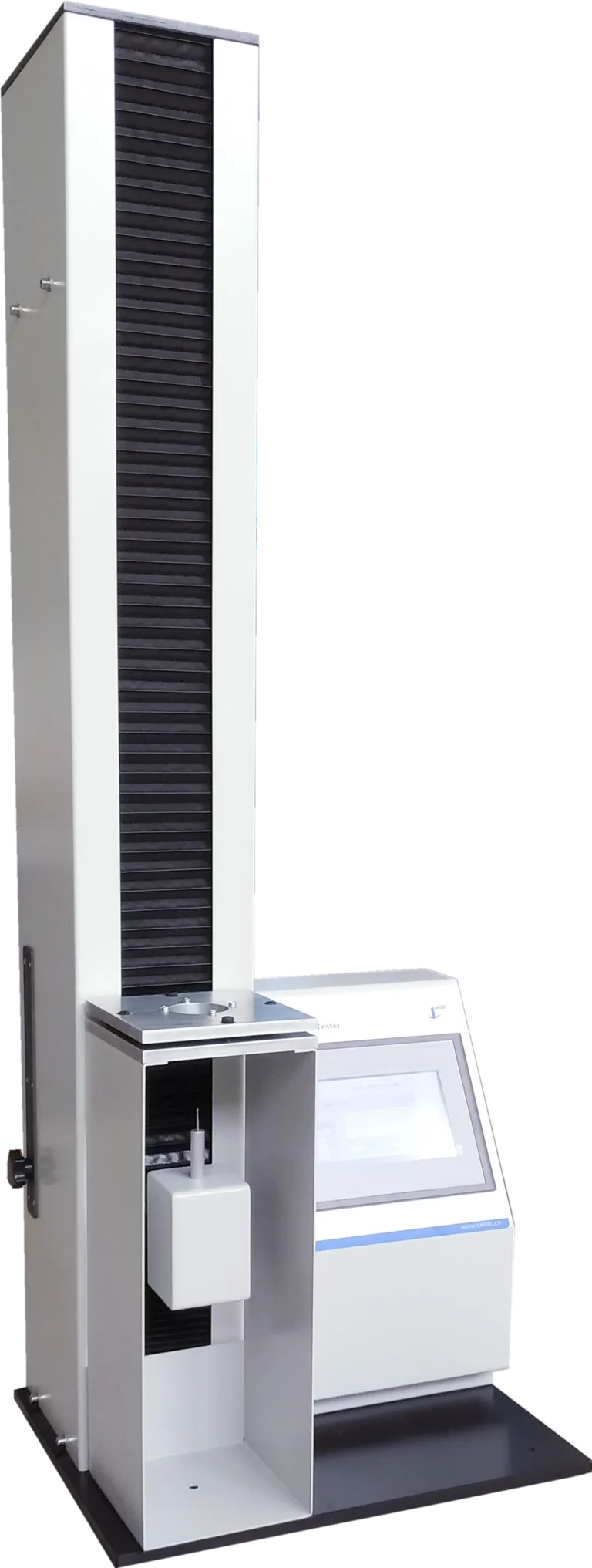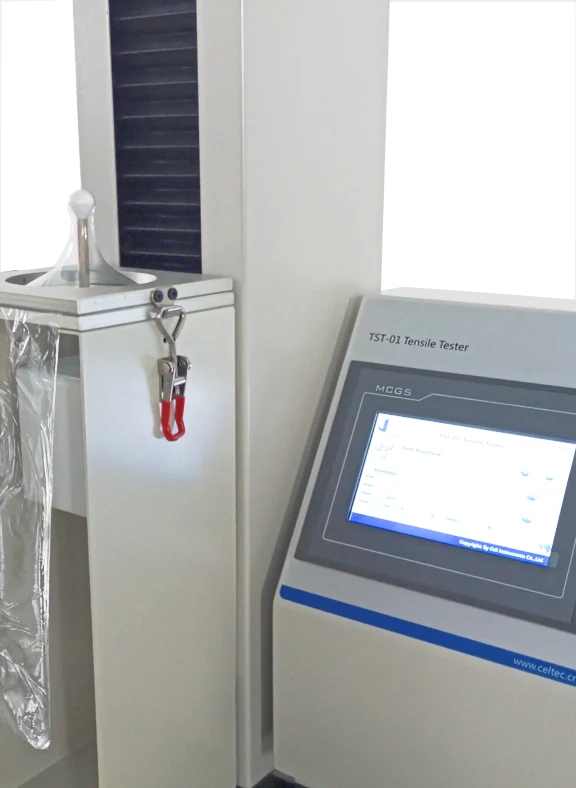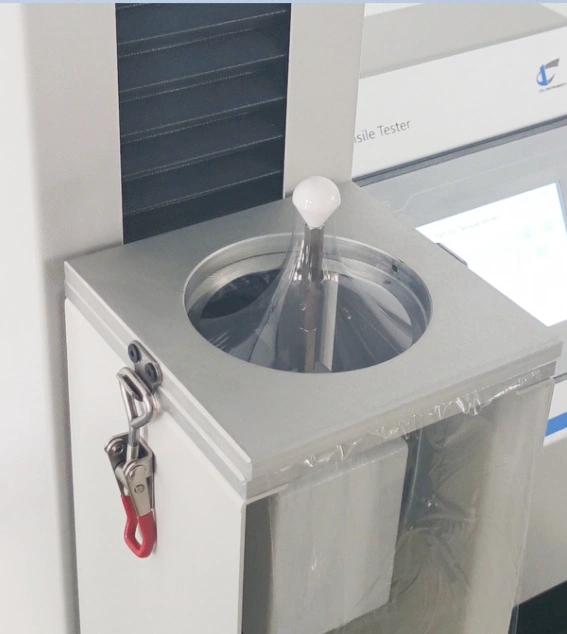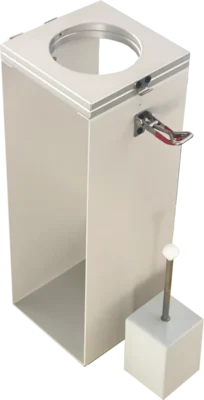Protrusion Puncture Tester
The Protrusion Puncture Tester is a precise instrument designed for evaluating the puncture resistance of stretch wrap films. This test assesses a film’s ability to withstand puncture forces under biaxial stress conditions. Essential for industries requiring durable packaging materials, this tester ensures reliable performance of stretch wrap films in real-world applications.
Overview of Protrusion Puncture Tester
The Protrusion Puncture Tester is an essential testing instrument designed to measure the puncture resistance of stretch wrap films and other plastic materials. The test simulates the stress encountered by packaging materials during transportation and handling, providing critical data about the film’s ability to absorb energy and resist puncture. By using a standardized low rate of penetration, this tester ensures consistent and reliable results, making it invaluable for manufacturers in the packaging industry.
Key Features:
Standard Test Conditions: Performs tests under controlled conditions to replicate real-world biaxial stress scenarios.
Critical Measurements: Provides data on maximum force, force at break, energy to break, and penetration distance.
Precision Testing: Accurate and reproducible measurements, ideal for quality control and R&D.
The Protrusion Puncture Tester follows the guidelines set by ASTM D5458, a standard method for measuring the puncture resistance of plastic films. This ensures the tester adheres to industry standards for testing materials used in packaging.
Applications of the Protrusion Puncture Tester
The Protrusion Puncture Tester is used in a variety of industries, particularly where stretch wrap films are integral to packaging and shipping. Here are some key applications:
- Packaging Industry: Widely used to test stretch wrap film and food wrap film, where puncture resistance is crucial for protecting contents during transportation.
- R&D and Material Development: Researchers and developers use this tester to evaluate new materials and film formulations, ensuring they meet the necessary durability standards.
- Quality Control: Manufacturers can use the puncture resistance test to monitor the consistency of film quality during production runs.
- Consumer Goods Packaging: Ensures the safety of items like electronics, medical devices, and consumer goods that require robust packaging to prevent damage during handling.
Why is puncture resistance testing necessary in the packaging industry?
- Protection of Contents: Stretch wrap films are widely used to secure products during storage and shipping. A puncture in the film can compromise the integrity of the package, leading to damage.
- Durability Assessment: In real-world conditions, packaging films undergo various stresses such as compression, tearing, and puncturing. Protrusion puncture resistance is a direct measure of a material’s ability to withstand these forces.
- Cost Efficiency: Testing the puncture resistance of plastic films ensures that films meet performance expectations, reducing the risk of product damage and returns, which can be costly.
- Compliance: Meeting industry standards like ASTM D5458 ensures that manufacturers are producing high-quality materials that comply with global packaging regulations.
Working Principle
The Protrusion Puncture Tester functions by applying a controlled biaxial stress to a specimen of stretch wrap film. The process involves the penetration of a probe through the film, and the tester measures various parameters such as the maximum force required to puncture the film, the distance of probe penetration, and the energy absorbed by the film before breakage.
Test Process:
- Specimen Preparation: A sample of the film is cut to size 150mm*150mm or a 150mm wide roll sample, and its thickness is measured.
- Probe Application: A pear-shaped TFE-coated probe is used to apply force to the film. The probe penetrates the material at a low rate of speed 250mm/min.
- Force and Penetration Measurement: The maximum force required to puncture the film, along with the penetration distance are recorded.
- Data Analysis: The data collected during the test provides insight into the puncture strength of the film.
This method ensures that the tester simulates real-life conditions where the film may be subjected to puncture or stress from sharp objects or mishandling.
Advantages of the Protrusion Puncture Tester
The precision ball lead screw mechanism ensures consistent speed and displacement, reducing testing variability.
The 7-inch HMI touch screen allows for easy operation, reducing training time and increasing efficiency.
Test speed, controlled penetration length, and load range are all adjustable to accommodate different testing needs.
Integrated program (and optional software) allows for comprehensive reporting, which is essential for quality control and compliance.
Suitable for a range of materials beyond stretch wrap film, including other types of plastic and flexible films.
The tester is fully compliant with international standards such as ASTM D5458.
Configurations and Accessories
The Protrusion Puncture Tester is designed with flexibility in mind, offering several configurations and optional accessories:
Standard: Includes the tester, probe, sample clamp,RS232 Port, power cord, manual, fuse.
Optional Accessories:
PC software, COM Line, sample plate, sample cutter, calibration weight, microprinter, sample clamp, loadcell, probe.
Coefficient of Friction (COF) Test Module:
The Coefficient of Friction test is useful for wrap film test when it slides against other materials.
For its cling nature, wrap film to wrap film COF tester is not needed. This feature makes the tester versatile for all kinds of film manufacturers.
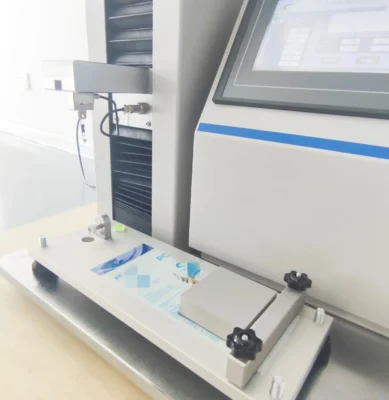
The Module will need COF test bed, sled kit.
Tensile, Elongation and other Puncture Test Module:
The tensile and elongation tester can be performed on its counterpart TST-01 Tensile Tester.
Other types of puncture tester can be performed by adding specific puncture probes or needles, sample clamps for different test areas, for example ASTM F1306.
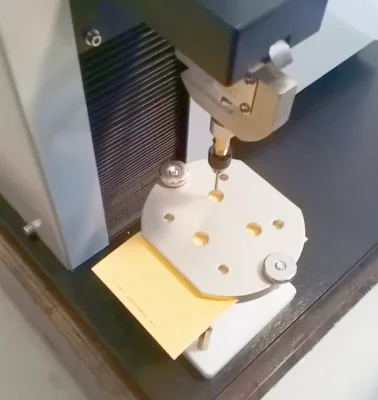
The Module will need sample jaws, puncture probes, sample clamps, etc.
Support and Training
At Cell Instruments, we provide comprehensive support and training for our customers to ensure they maximize the potential of their SPC-01 Peel Cling Tester. Our services include:
- Installation Support: Assistance with setup and calibration.
- Training Materials: In-depth training on how to operate the tester.
- Technical Support: Ongoing customer service for any operational issues or inquiries.
- Upgrades and Maintenance: Keep your equipment up to date with the latest program.
To save cost for customers, we recommended our always free-of-charge online/remote way of above services.
FAQs about Peel Cling Tester
What is the purpose of the Protrusion Puncture Test?
The test is used to measure the puncture resistance of stretch wrap films, which is critical for determining their durability and effectiveness in protecting products during transport and storage.
How do I prepare the specimen for testing?
The specimen should be cut to the specified size (150x150mm), or 150mm wide in a roll.
What is the significance of biaxial stress in the test?
Biaxial stress simulates the actual stress encountered by stretch wrap films during handling and transportation, ensuring that the test results are reflective of real-world conditions.
Can I test other materials besides stretch wrap film?
Yes, the Protrusion Puncture Tester can also be used to test other types of plastic films and materials, making it versatile for various packaging applications.

